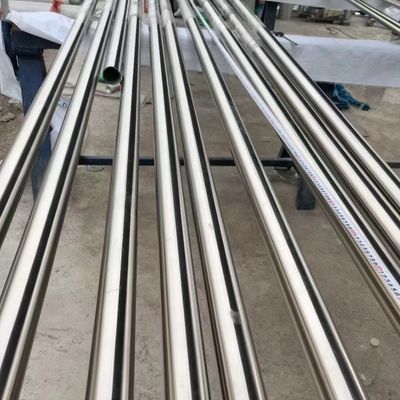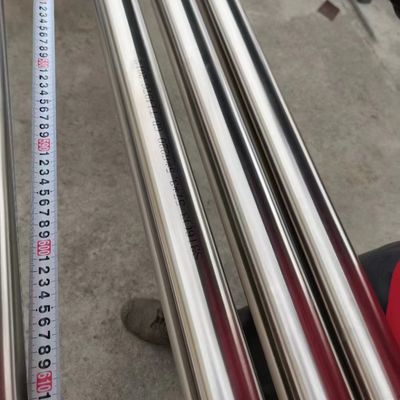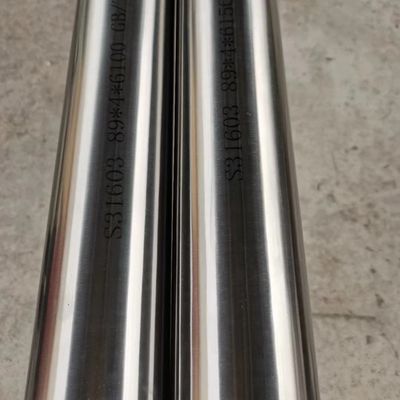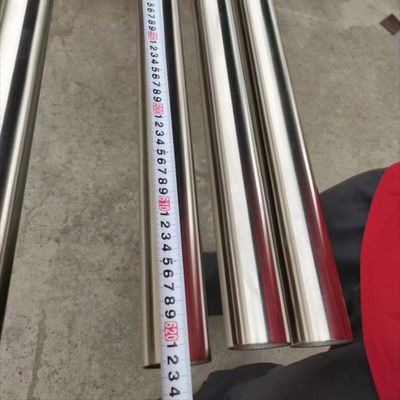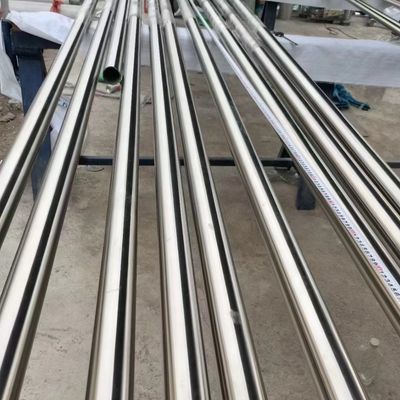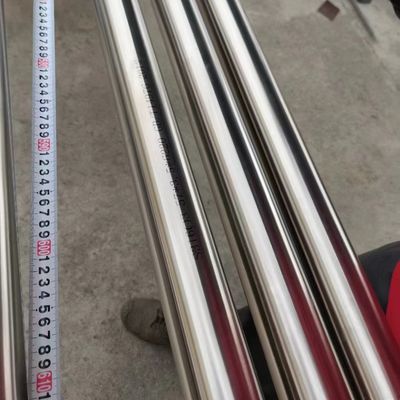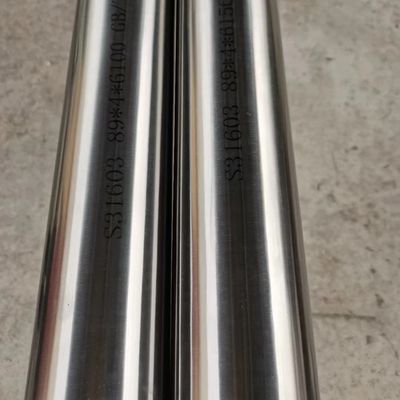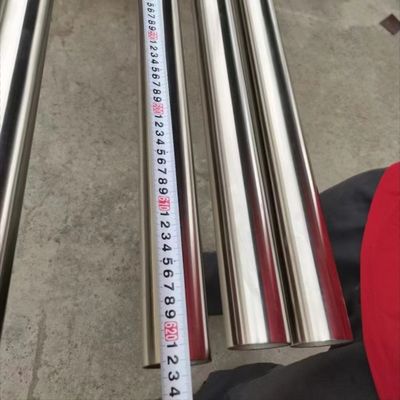-
 Raian IonescuMaterial quality very good. we have cooperate more than 10 Years. They trade lots kinds of steel material. All material quality good. They duty for all material quality. We are planing continue cooperate with them in the future
Raian IonescuMaterial quality very good. we have cooperate more than 10 Years. They trade lots kinds of steel material. All material quality good. They duty for all material quality. We are planing continue cooperate with them in the future
Food Grade TP316L Stainless Steel Pipe Poloshing Both Side ASTM A270 SS Pipe

Contact me for free samples and coupons.
Whatsapp:0086 18588475571
Wechat: 0086 18588475571
Skype: sales10@aixton.com
If you have any concern, we provide 24-hour online help.
x| Products | Stainless Steel Pipe | Grade | TP316L |
|---|---|---|---|
| Standard | ASTM GB EN | Length | 6m Or Custom Cutting Any Length As Request |
| Diameter | DN10 - DN400 | Wall Thickness | SCH10 - XXS Or Unstandard Size |
| Type | Seamless Pipe | Service | Cutting, Polishing |
| Application | Industrial | Packing | Wooden Box Or PP Bag |
| Highlight | ASTM A270 Stainless Steel Pipe,TP316L Stainless Steel Pipe,Food Grade Stainless Steel Pipe |
||
Food Grade TP316L Stainless Steel Pipe Poloshing Both Side ASTM A270 SS Pipe
| Product Name | Stainless Steel Pipe |
| Standard | JIS, AISI, ASTM, GB, DIN |
| Outer Diameter | 6mm-530mm (1/8"-20") or as the customers' requirements |
| Length | 1000-6000mm or as the customers' requirements |
| Grade | TP201, TP304, TP304L, TP310S, TP316, TP316L, TP317L, TP321, TP309S, TP410, TP420, TP430, TP904L |
| Thickness | 1mm-60mm |
| Type | weld |
| Surface | NO.1/NO.4/8K/HL/BA/2B |
| manufacture | Hot Rolled/Cold Rolled |
| Application | Construction field, ships building industry, petroleum & chemical industries, war and electricity industries, food processing and medical industry, boiler heat ex-changer, machinery and hardware fields ,etc. |
| Packing | Weaving bag, non-woven fabric, seaworthy bundle,wooden case if required |
| Delivery time | Within 7 - 10 working days, according to customers' quantity |
| Payment | L/C or T/T |
| MOQ | 1 Ton |
| Quality | High Quality.SGS inspection is accepted if needed |
| Productivity | 1000 Tons/Month |
Our Company offers food-grade stainless steel tubing for sanitary, dairy and food applications, sizes range from 1/2″ to 8″ in outside diameter, there are various stainless steel grades to select from, 300 series and 400 series grades available, it is suitable for food processing due to their composition and properties, and not harm human health.
Generally, these tubes meet both ASTM A270-S2 and 3A specifications, surface roughness can reach 20Ra Max inner diameter (ID) and 32Ra Max outer diameter (OD) via mechanical polishing, and polished tubing undergoes multiple passes through the polishing heads to remove any unwanted residue, and undergoes a rigorous quality inspection, including destructive and non-destructive examination, at the mill before shipment.
Typical Food Grade Stainless Steel
304 Stainless Steel
304 is standard 18/8 chromium-nickel grade, it is the most commonly used food-grade stainless steel, it can withstand corrosion from most oxidizing acids, the durability of 304 makes it easy to sanitize, and therefore ideal for many kitchen and food applications. It also has good forming and welding properties, allowing it to be manufactured into a variety of shapes.
Cheaper than 316L, 304 is an economical and practical choice for most environments.
- Brewing
- Milk processing
- Wine making
- Refrigerators
- Stoves
- Sinks
- Dishwashers
- Fermentation vats
- Storage tanks
316L Stainless Steel
316L is the second most commonly used food-grade stainless steel, contains 16% chromium, 10% nickel, and 2% molybdenum, it has better corrosion resistance because it possesses more nickel and higher molybdenum content than 304, especially in chloride environments, such as salt.
Compared to 304, 316L is an expensive option, but it can be used in severe corrosion environments, and the application requires greater strength and hardness, 316L makes for great food-grade stainless steel containers for nearly any food application.
430 Stainless Steel
430 has less nickel content and the same chromium content as 316L, therefor it makes it a more affordable alternative for some food makers, 430 SS has a strong resistance to nitric & organic acids and is often used for applications where prolonged contact with mildly acidic compounds is a concern. The alloy also boasts a resistance to sulfur and oxidation.
Typical Applications Of The Various Stainless Steel Types
| Types | Typical Applications |
|---|---|
| 420, (Martensitic) | Vats, Bowls, Pipework, Machinery Parts, (I.E. Components Requiring Some Formability Or Weldability). Corrosion Resistance Is Superior To 430. |
| 430, (Ferritic) | Table Surfaces, Equipment Cladding, Panel, (I.E. Components Requiring Little Formability Or Weldability). Used For Moderately Corrosive Environments, (E.G. Vegetables, Fruits, Drinks, Dry Foods, Etc). |
| 304, (Austenitic) | Components Are Used With More Corrosive Foods, (E.G. Meat/Blood, Foods With Moderate Salt Contents), Which Are Frequently Cleaned, With No Stationary Solids And Not Under Excessive Stress. |
| 316, (Austenitic) | They Are Used With Corrosive Foods, (E.G. Hot Brine With Solids, Stagnant And Slow Moving Salty Foods). Higher Strength Than Austenitics. Good Resistance To Stress Corrosion Cracking In Salt Solutions At Elevated Temperatures. |
| 1.4539, (Austenitic) | They Are Used With Corrosive Foods, (E.G. Hot Brine With Solids That Act As Crevice Forms, Stagnant And Slow-Moving Salty Foods). |
| 1.4462 (Duplex) | They Are Used With Corrosive Foods, (E.G. Hot Brine With Solids, Which Act As Crevice Formers, Stagnant And Slow Moving Salty Foods). Good Resistance To Stress Corrosion Cracking In Salt Solutions At Elevated Temperatures. Used In Steam Heating And Hot Work Circuits, Hot Water Boilers, Etc |
| 6%Mo. Types (Austenitic) | They Are Used With Corrosive Foods, (E.G. Hot Brine With Solids, Which Act As Crevice Formers, Stagnant And Slow-Moving Salty Foods). Good Resistance To Stress Corrosion Cracking In Salt Solutions At Elevated Temperatures. Used In Steam Heating And Hot Work Circuits, Hot Water Boilers, Etc |
Making Food Grade Stainless Steel Parts Cleaning
Food grade stainless steel has many and properties and advantages to use in food processing, but there are a few things that you should know about food-grade stainless steel parts.
- Do not put salt, soy sauce, vinegar, vegetable soup and other things for a long time. People who have learned chemistry know that these substances contain a lot of electrolytes, which will make them react chemically and release toxic elements
- Alkaline substances and organic substances cannot be stored in it for a long time, which will also promote chemical reactions in stainless steel
- Keep the stainless steel parts clean and dry, especially when containing acid and alkali substances, and wash them out as soon as possible
- Do not think that ordinary stainless steel material will not produce bacteria if its surface is smooth. it may bring bacteria to the surface after a period of use. it is recommended to disinfect it at high temperature for 1-2 months
![]()
![]()
![]()
![]()



